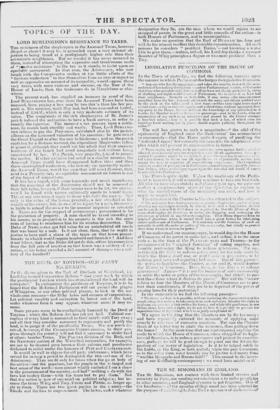we e " Any tow who has the oppurtuoitv, and
takes the trouble, to watelt the item-
!inflation of lawmaking througlom t .;.!,:odern Parliamentary session,• %eill.wouder
that those who speculate and :IA in h affairs have not oh eatly pocketed, by virtue where. • of skulking and night-walkiier (if Parliament the fin-tones of at I st half
The present week has supplied an instance in proof' of this. their neighbours. - Brought to little,' if an' notice —the anuouctilement Lord BURLINGTON has, ever since the Assessed Taxes have been mumbled from the bar—iestmoie ulterwards the name and —objects gabbled over
n by the clerk at the toble—reogi list time—within forty-eight hours read a by two thils than his fair pro- by time—a day or two afte;-;vards cad a third time, without opposition front
instead of 2,9431., which is only a very motlerate estimate of its .hatAyiAteasrttti with:int the knowledge of any.individual in it value. The complaints of the rich shopkeepers of St James's ensce„„e;;ae. ufe anyrstin ott ipaairiedntage—dseni t toltehe_Lords, who are ii0'.:ustrle that L'is• isle a ulof
reporters know nothing but hy should acquire publicity throughout the realm?"
The evil has grown to such a magnitude—" the offal of the squirearchy of England since the Restoration" has aceumula-tcti li "
• adopted, s:■ii_%2 remedial one= are filth application.
to repudiate all cour!..olo.:■ry enactments. ComMittte
„
w.toxe preliminary report upon the intended bill would of course
Leb nney is quite right. lialess the niacin' tery of the Patlia- MOM IS will assuredly euntinue to turn out bad work_ : .All this we leive stated; and aleive a :year ago, we gave our readers it roppletneetary sheet of' ilie Si.y.y:ce'or, tO exriain in what I he imeerfeetions of the nrichinery cult isted, and how it might: he renit,il.
The at temieu of the Courier is likievise attracted to thi:; sArit.joet. " The evil . iscs from havirug nu p: ii Legislature ; aml we ch-spair
of seeir.g. airy re;alaulons devised, hy wi1h such a Legislature, Llo;
can In turd, npic.;s it be down as a priocik, Mat the House of an-2-
mons shall confiou "is VOthil; Me Soppiles, and redres4ing the
grievances of which in: conslitucuts complain. That House departed &omits origin( functions wino it turned itself into a great factory for fabricating almost endless acts of Parliament. It is certainly nut the business of such an assembly to settle the order or policy ut the community, but chiefly to protect these film whom it derives its power."
If we understand our contemporary, he weuld deprive the House of Commons of' its power to matte 'wawa, and reduce it to the saeae state a; in the time of the PLAN,TA.G.::NET3 and 1'UDORS*-10 the perforiname of its " original functions" of voting supplies, and humbly petitioning the King to redress gi-ieveeces. c‘i"e petitioting the Kid,e- to rediess ,t1eie'..aces; for the only mode, by which the House itself eau or coull icelress gi.L;vanc-c-,, is by making good law's and repealing bail ones. But of this power— iii • power to legislate—the Courier, as we read it, would deprive the Ileetim! of Commons. How, thoo, is the Hoe Ai to redress grievances? Again—" it not the bths.iilb:s Sil.e;1 an assembly io settle the order or polio)/ of the coneunnity, but chieily to pro, tect those from whom it derives its power." But will the Courier ieform us how the Members of the House of Commons are to pro- tect their constituents, if they are to be deprived of the poweraif passing laws for their protection?
In the same article we find the following passage- " We de tee see how it is possible, without rendering the representatioa of the people altogether useless, to takeaway from each and every Member the right to originate any measure which strikes his fancy ; and while d5.5 gentlemen, in one House alone, have soil: a right, we do not see how it is pi-sible to prevent the superabundance of lei;islation whiell is so justly complained of."
We agree ie tlii :king that the '2s:embers are by far too many; and have repeate lly enforced the necessity of applyieg sotne
remedy to vive of excessive numbers. But can the Coarkr
think of no better way to abate the nuisance, than pulling down




















 Previous page
Previous page